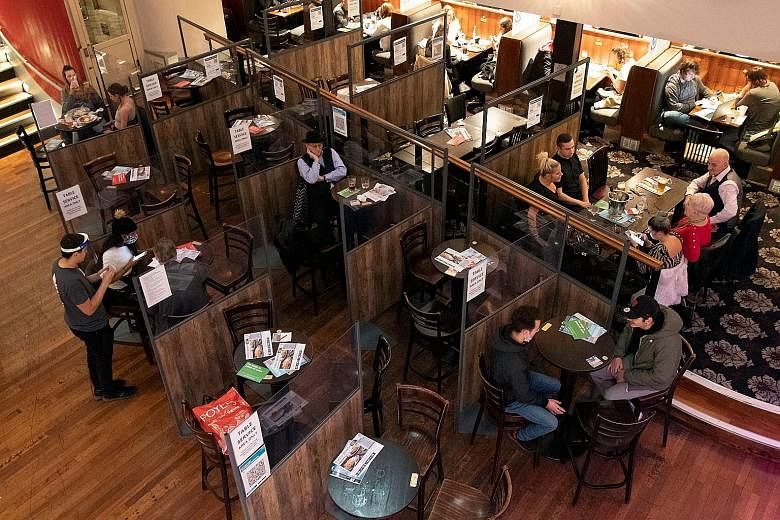BRUSSELS • A raft of European countries, including Italy and Belgium, took desperate new measures yesterday to try to combat a second wave of coronavirus infections as the death toll from Covid-19 surpassed 250,000 in Europe, according to an Agence France-Presse tally.
Many governments are seeking to avoid the full-on lockdowns imposed in the first wave as they battle to keep their economies going, but in some countries, people are chafing at the new restrictions on daily life.
In Belgium, where hospitalisations rose 100 per cent in just the last week, bars and restaurants were closed yesterday for a month and a curfew will be reinforced overnight.
"Managers, chefs, dish-washers, everyone is suffering," Mr Angelo Bussi said as he put the key in the lock of his Brussels restaurant late on Sunday. "We don't feel like anyone cares. It breaks my heart."
Belgium's second major lockdown comes after Prime Minister Alexander de Croo warned that the situation was "much worse" than in March, when there was an almost complete confinement.
Italy, the initial epicentre of Europe's outbreak, also announced fresh curbs, including earlier closures for bars and restaurants, and a push to increase working from home.
"We cannot waste time," its Prime Minister Giuseppe Conte said, also flagging bans on amateur team sports and local festivals.
Meanwhile, Switzerland made mask wearing compulsory in indoor public spaces and put limits on public gatherings after infections doubled over the last week.
"The second wave is here, earlier and stronger than we expected, but we are prepared," said Swiss Health Minister Alain Berset.
Wales announced yesterday that it will impose a two-week "fire-break" lockdown from Friday in which everybody apart from essential workers must stay at home to combat an accelerating second wave of the virus.
Welsh First Minister Mark Drakeford said he understood that people are tired of coronavirus restrictions, but tougher rules are essential as critical care units are already full.
"It will have to be sharp and deep in order to have the impact we need," he told reporters. "Everyone in Wales will be required to stay at home. If we do not act now, it will continue to accelerate."
All non-essential retail, leisure, hospitality and tourist businesses will have to close, as will places of worship.
Elsewhere in the United Kingdom, British Prime Minister Boris Johnson is facing some calls to abandon his strategy of localised lockdowns in England and impose a nationwide lockdown similar to the one enacted in March during the first wave of the disease.
His regional tiered approach is being tested by Mr Andy Burnham, the mayor of Manchester, who is opposing a lockdown on his city without increased central government funding to deal with the economic fallout.
Mr Johnson has said he may need to intervene if no deal can be reached, and force the city into the top "very high" risk category, with his office yesterday warning that local intensive care capacity could be overwhelmed by Nov 12.
However, Mr Johnson is resisting rolling out stringent restrictions across England. "You are not going to save lives in parts of the country that have higher infection rates by closing down parts of the country that have lower infection rates," his spokesman said yesterday.
Meanwhile Irish ministers were set to agree yesterday on a new set of strict measures that will shut non-essential retail across the country but aim to keep schools open, two sources familiar with the plans said.
Ireland's health chiefs last week renewed a call to move the country to level 5, the highest level of constraint. A minister said on Sunday that decisive nationwide measures were coming, but that they would stop short of the full lockdown imposed earlier this year.
Russia, however, said it would not introduce strict restrictions to curb the virus, after daily cases hit a record high of 15,982 yesterday. The authorities also reported 179 deaths in the previous 24 hours, bringing the official death toll to 24,366.
A vaccine remains the great hope to end the cycle of imposing and lifting lockdowns across the world, and the United Nations said yesterday that it would stockpile a billion syringes worldwide by the end of next year for that purpose.
"Vaccinating the world against Covid-19 will be one of the largest mass undertakings in human history, and we will need to move as quickly as the vaccines can be produced," Unicef executive director Henrietta Fore said.
AGENCE FRANCE-PRESSE, REUTERS











